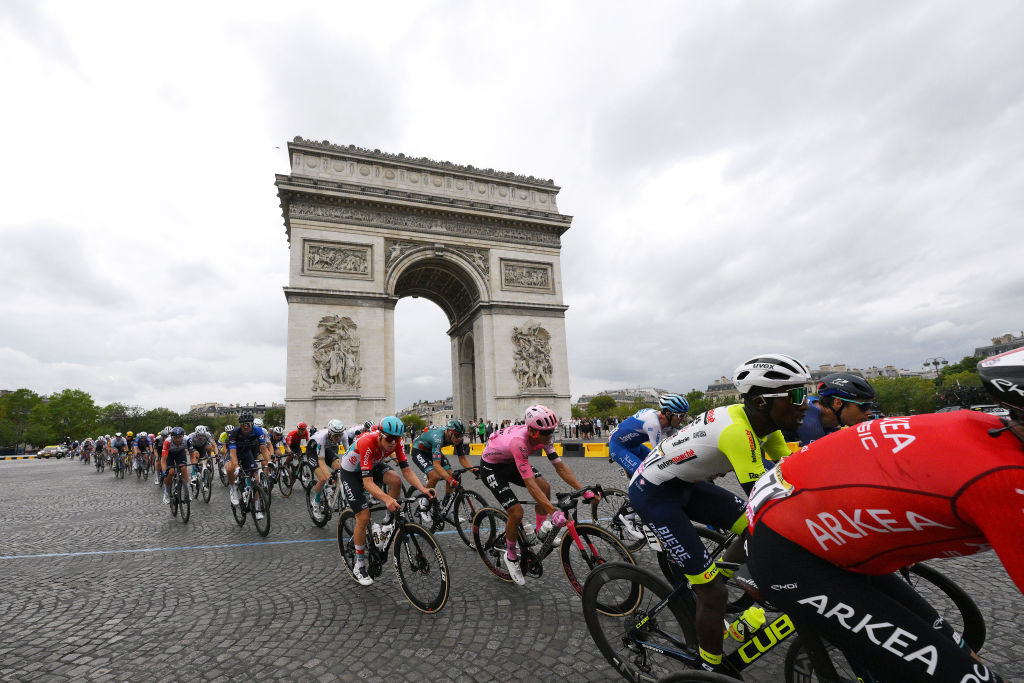New plan to inject venture capital into pro cycling 'necessary step', says Vaughters
Plugge tries to convince Tour de France organisers of merits of new league-not-league

This week reports uncloaked a behind-the-scenes push to overhaul the business model of professional cycling. Led by Jumbo-Visma CEO Richard Plugge and Soudal-QuickStep's wealthy backer Zdenek Bakala, the scheme is designed to bring large amounts of venture capital into the sport to help shore up what are increasingly dire economics.
The details of the plan are still unclear, but Plugge and EF Education-EasyPost CEO Jonathan Vaughters spoke to the 'Radio Cycling' podcast revealing some new information.
The plan is to combine a number of teams and events into a more easily-digestible format accessible to new viewers, one that avoids any overlapping races such as now exist in the current WorldTour.
The tenets of the scheme sound very much like the genesis of the WorldTour that dates back to 2004, ensuring the top riders and teams are in the same series of races throughout the year.
There is one key difference, according to Vaughters, in that Plugge's project aims to bundle races into one package to sell rights to broadcasters and bring in revenue that can be shared with teams - all of which still sounds very familiar to anyone who followed the last attempts at a breakaway league that Bakala threw his weight behind in 2011.
This time it appears to be more serious, with Reuters reporting that a consulting group is appealing for interest from investors with an imminent deadline, trying to, according to the podcast, raise €600 million to bring Giro d'Italia organisers RCS Sport into the fold.
However, as both the UCI discovered with the ProTour from 2004-2008 and teams discovered in the attempted breakaway league of 2012, no change can happen without Tour de France organisers ASO.
The latest race content, interviews, features, reviews and expert buying guides, direct to your inbox!
Plugge revealed on the podcast that he has already spoken to ASO's head of strategy Yann Moenner and intends to hold further discussions with the ASO and the UCI "in the coming week".
"The world is changing around us, and our competitors are not the other teams or organisers," Plugge said. "Our competitors are football or rugby, NFL and Formula 1. So we need to make sure that we are 'future ready' as a sport. And I think [UCI President David] Lappartient has some ideas about that. Yann [Moenner] - many people have some ideas about it. But we have to make sure that in five years' time, this sport is bigger than it is today and then everybody will be benefiting from that."
Vaughters, having rescued his team from a late-season near-demise, said he was in full support of the proposal.
"I can speak for teams and I can speak for a lot of the events on the calendar that are really struggling to make ends meet. Cycling has always subsisted off of this sponsorship revenue model, and that applies to teams, but it also applies to smaller races where you have to find sponsorship revenue in order to produce the event.
"This isn't about anyone becoming rich out of this equation. This is about stabilising the economics so that we do not run into situations like Jumbo-Visma almost going bankrupt at the end of the season," Vaughters adding that HTC-Highroad were in the same situation in 2011 and ultimately disbanded.
"This is about stabilising the economic underpinnings of the sport which is good for everyone. So of course we are going to be very active and push forward on."
Vaughters was already linked with the previous breakaway league efforts and says the current idea isn't quite the same.
As an aside, he described the scheme as "not quite [a league] because this would function under the umbrella of the World Tour" and as being necessary for the sport's future.
"In other sports, media rights or broadcast rights are the primary revenue source. Cycling broadcast rights are almost entirely occupied by large race promoters and the teams do not receive distribution of that at all.
"In this case, the allies of the teams, athletes, and smaller races would bundle all of those media rights into a package."
Single teams or races like the GP de Plouay, a smaller WorldTour one-day race, may not have a lot of value alone, he said, "But when you put 18 teams together, and you put together a number of these smaller events and produce a series and produce ... a series ... packaging it together will create a greater amount of interest and a greater value than trying to do it individually.
"So that's why everyone should be interested in this - you start to generate revenue sources without relying solely on sponsorship."
Any change will likely be met with resistance from teams who are unwilling to risk their current meagre budgets or fall afoul of the ASO. There has already been pushback within the AIGCP (Association International des Groupes Cyclistes Professionels) teams association against Plugge, the sitting president.
"Even [if Plugge] is a divisive figure, I don't think that should detract from this proposal and this way forward," Vaughters said.
"This is a necessary step for cycling and so any sort of personal conflicts that people might have with Richard, I would hope they would be able to put them aside in order to make this step forward and start building something collective that betters the entire sport."

Laura Weislo has been with Cyclingnews since 2006 after making a switch from a career in science. As Managing Editor, she coordinates coverage for North American events and global news. As former elite-level road racer who dabbled in cyclo-cross and track, Laura has a passion for all three disciplines. When not working she likes to go camping and explore lesser traveled roads, paths and gravel tracks. Laura specialises in covering doping, anti-doping, UCI governance and performing data analysis.